|
|
|
Sort Order |
|
|
|
Items / Page
|
|
|
|
|
|
|
| Srl | Item |
| 1 |
ID:
187981
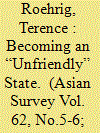

|
|
|
|
|
| Summary/Abstract |
When Russia invaded Ukraine, South Korea’s initial response was cautious. While criticizing Moscow’s actions, the Moon administration also indicated it would join any multilateral sanctions effort but would not impose its own unilateral sanctions as the United States, the European Union, and other Western democracies had done. After receiving internal and external criticism along with the likelihood of economic repercussions for not imposing its own sanctions, South Korea changed course and altered its hedging strategy toward a more robust response to Russian aggression. The war forced South Korea to reassess its relationship with Russia, and despite landing on Moscow’s list of “unfriendly” states, determined that its long-term interests were better served by altering its ties with Russia in favor of greater alignment with other liberal democracies.
|
|
|
|
|
|
|
|
|
|
|
|
|
|
|
|
| 2 |
ID:
107926


|
|
|
| 3 |
ID:
093614


|
|
|
|
|
| Publication |
2010.
|
| Summary/Abstract |
Interpretations of history have been a source of tension in East Asia but usually involve Japan and the Second World War. Yet, in the past ten years, another controversy has been brewing over history, this time between South Korea and China over claims to 'ownership' of an ancient kingdom. This article is a case study that examines how states utilize reinterpretations of history for current and future strategic goals. The result has been a dispute that has resembled a security dilemma where China's initial actions, deemed to be largely defensive by Beijing, were perceived in Seoul as offensive, provoking a counter-response that has in turn, alarmed China.
|
|
|
|
|
|
|
|
|
|
|
|
|
|
|
|
| 4 |
ID:
081946
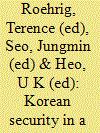

|
|
|
|
|
| Publication |
Westport, Praeger Security International, 2007.
|
| Description |
vii, 213p.
|
| Standard Number |
9780275998349
|
|
|
|
|
|
|
|
|
|
|
|
Copies: C:1/I:0,R:0,Q:0
Circulation
| Accession# | Call# | Current Location | Status | Policy | Location |
| 053578 | 355.0330519/ROE 053578 | Main | On Shelf | General | |
|
|
|
|
| 5 |
ID:
174815
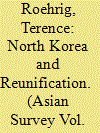

|
|
|
|
|
| Summary/Abstract |
Efforts to denuclearize North Korea continue, but it is highly doubtful whether this goal will be reached. An often-expressed fear of a nuclear-armed North Korea is that it might use this capability to coerce reunification with the South on its terms. Though its leaders often speak of the desire for reunification, North Korea will not and could not pursue a successful nuclear coercion strategy because it carries an inordinate amount of risk, even for Pyongyang, which raises serious doubts about the credibility of its nuclear threats, the possibility of success, and the likelihood of pursuing such a strategy in the first place. And even if North Korea were to succeed, its efforts to integrate the South Korean economy would be a disaster, leading to the end of the North Korean regime.
|
|
|
|
|
|
|
|
|
|
|
|
|
|
|
|
| 6 |
ID:
090090
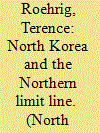

|
|
|
|
|
| Publication |
2009.
|
| Summary/Abstract |
Shortly after the end of the Korean War, the United Nations Command promulgated the Northern Limit Line (NLL) as a maritime boundary in the West Sea (Yellow Sea). Since that time, the NLL has been a source of contention between North and South Korea culminating in two naval clashes in 1999 and 2002. A solution to the NLL dispute in the near future is unlikely so long as the security situation remains the same. North Korea may have a reasonable complaint, and an international tribunal would likely draw the line farther south, though not as far as Pyongyang desires. So long as North Korea remains a serious security threat, South Korea will be reluctant to make any changes. The most likely solution will be a negotiated settlement, but this will require North Korea to demonstrate its willingness to compromise on its position. Pyongyang should continue to state its opposition to the current NLL, but through diplomatic channels that do not threaten security while also taking steps to improve the overall security situation in the region. The views expressed in this report are the author's alone and do not represent the official position of the Department of the Navy, the Department of Defense, or the U.S. government.
|
|
|
|
|
|
|
|
|
|
|
|
|
|
|
|
| 7 |
ID:
145480
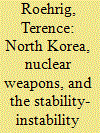

|
|
|
|
|
| Summary/Abstract |
As the chances wane of North Korea relinquishing its nuclear weapons, how will this capability affect its behavior and tolerance of risk? Increasingly, scholars are using the Cold War concept of a stability-instability paradox to describe the possibility of Pyongyang being more willing to tolerate risk and conduct increased numbers of lower-level provocations under the cover of nuclear weapons. North Korea has long been tolerant of accepting a great deal of risk prior to its acquisition of nuclear weapons, and it is not clear if nuclear weapons have increased that tolerance––or as some have argued, it may actually decrease North Korea’s risk tolerance, making it more cautious. While North Korea’s rhetorical barrages in recent years have exceeded past outbursts, and weapons testing has done a great deal to rattle nerves, much of this can be viewed as part of its deterrence-posturing and less of the more aggressive, status quo-altering actions predicted by the stability-instability paradox.
|
|
|
|
|
|
|
|
|
|
|
|
|
|
|
|
| 8 |
ID:
151728
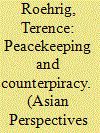

|
|
|
|
|
| Summary/Abstract |
As the international security environment grows increasingly complex, the need for multilateral solutions grows. Two such efforts are United Nations peacekeeping and counterpiracy operations off the coast of Somalia. Over the years many states have contributed police, observers, military personnel, ships, and other assets to support these multinational efforts. Since 2009 Seoul has sent a destroyer and a team of Navy SEALS to the counterpiracy operations near Somalia. In this study I contrast South Korea's contributions to UN peacekeeping and maritime security with those of Australia, China, and Japan.
|
|
|
|
|
|
|
|
|
|
|
|
|
|
|
|
| 9 |
ID:
101544
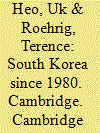

|
|
|
|
|
| Publication |
Cambridge, Cambridge University Press, 2010.
|
| Description |
vii, 216p.
|
| Standard Number |
9780521743532
|
|
|
|
|
|
|
|
|
|
|
|
Copies: C:1/I:0,R:0,Q:0
Circulation
| Accession# | Call# | Current Location | Status | Policy | Location |
| 055588 | 951.95044/HEO 055588 | Main | On Shelf | General | |
|
|
|
|
| 10 |
ID:
157697


|
|
|
|
|
| Summary/Abstract |
TERENCE ROEHRIG argues that military, strategic, and moral considerations make it unlikely that the United States would use nuclear weapons to defend South Korea. He claims that the U.S. nuclear umbrella has served as a political tool used to demonstrate the U.S. commitment to South Korea.
|
|
|
|
|
|
|
|
|
|
|
|
|
|
|
|
| 11 |
ID:
179238


|
|
|
|
|
| Summary/Abstract |
In 2020, the United States sought to implement its policy of a Free and Open Indo-Pacific to address the challenge of a rising China. US–China antagonism increased, spurred on by economic tensions and concerns for Beijing’s actions with respect to Hong Kong, Taiwan, the South China Sea, and the Uighurs, with all this occurring in the context of the global pandemic. As the Trump administration came to a close, the most pressing question was how the turn to great power competition, which intensified in 2020, would evolve under a Biden administration.
|
|
|
|
|
|
|
|
|
|
|
|
|
|
|
|
| 12 |
ID:
185196


|
|
|
|
|
| Summary/Abstract |
The past year was a transition, with President Biden proclaiming “America is back,” signaling a change in the agenda and style of US foreign policy. Yet the Biden administration’s approach in the Indo-Pacific has been one of both continuity and change. “Strategic competition” remains the focus of US–China relations, with tensions increasing and few signs of improvement. Yet, it is imperative that this relationship be managed carefully in the years ahead to keep competition from turning into military conflict.
|
|
|
|
|
|
|
|
|
|
|
|
|
|
|
|
|
|
|
|
|